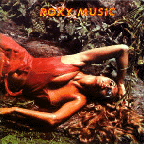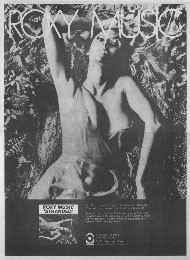![]()
  |

Stranded
Roxy Music
Atco 7045
Released: May 1974
Chart Peak: #186
Weeks Charted: 4
 Two British bands are genuinely stretching the dimensions of pop music. One, 10 c.c., has already found a degree of popularity in the States. Roxy Music has been unable to cross the Atlantic so far, but that should change with this album. Stranded is one of the most exciting and entertaining British LPs of the Seventies.
Two British bands are genuinely stretching the dimensions of pop music. One, 10 c.c., has already found a degree of popularity in the States. Roxy Music has been unable to cross the Atlantic so far, but that should change with this album. Stranded is one of the most exciting and entertaining British LPs of the Seventies.
Roxy has constructed the modern English equivalent of the wall-of-sound. One instrument, either the guitar or a keyboard, will sustain or repeat a note, and the other instruments will build on top of it. Added to the thick mix is the unique voice of Bryan Ferry, who sounds alternately tormented ("Psalm"), frantic ("Street Life"), or about to sink his teeth into your neck ("Mother of Pearl"). He delivers his consistently clever lyrics in the most disquieting baritone in pop. Everwhere there is menace.
 Click image for larger view. |
Like "Street Life," "Psalm" fades in, with an organ swelling slightly to introduce Ferry's half-intoned, half-sung ode to the Divine. As the group slowly joins in and increases volume, there's a bolero effect, and toward the end of the extended piece a Welsh male choir enters. Soon, the group sounds frenzied, yet not irreligiously so. Ferry is a possessed man offering a prayer, and this exceptional "Psalm" sounds like a wily demon's prostration before God.
"Street Life," a highly enjoyable entry (and British hit single), opens with what sounds like a UFO coming in for a landing and ends with fading finger-snapping. Ferry spits out his literate lyrics to chaotic uptempo support. The references to "pointless passing through Harvard or Yale" as "only window shopping... strictly no sale" may draw a few Ivy League smiles.
Only on "Amazona" does Ferry's cleverness get the better of him -- a couple of puns provoke groans. But the intriguing instrumental track, with its several shifts of mood, dynamics and tempo, helps save it.
- Paul Gambaccini, Rolling Stone, 5/23/74.
Bonus Reviews!
This has what they call a "sexploitation" cover photograph. If one gets past that, there's credit information listing such titles as "Psalm" running such lengths as eight minutes and four seconds. If one gets past that, he will find lyrics about as pretentious as the average British weirdo group is pushing at us these days, and some melodies that are about as original as Spiro Agnew's plots, fictional and financial, and, in addition, an outlandish vibrato in the lead singer's throat. It isn't all bad, though; Bryan Ferry's washboard larynx does make interesting sounds sometimes, even if it never makes pretty ones, and the band does seem to have an understanding of the textural and dynamic potential of rock. They actually make good use of six full minutes for the closing "Sunset," wherein repetition seems natural, evoking a cycle-of-nature subtheme in the bowels (where, heh heh, else?) of the arrangement. And at other times, drummer Paul Thompson leads the band into sudden moves that seem to have been just the thing. A couple of songs in there are real dogs, though, and the singing does get to be a little like having one's blood pressure tested after a while. Kind of a strange group, but the album is either a little too strange or not quite strange enough.
- Noel Coppage, Stereo Review, 9/74.
Top British band makes Atlantic debut with this set of their own peculiar brand of rock. Lead singer Bryan Ferry is becoming increasingly known in the U.S., which should help sales.
- Billboard, 1974.
With the recent departure of Eno, lead crowd pleaser-wierdo of the band, Roxy Music has fallen into the more than able hands of lead singer-pianist Bryan Ferry. The rejuvenated Roxy is ten times the group the old one was with a distinct, though diversified, flare for exotic melodies and heady instrumentation. Ferry is a bit of a romanticist, lyrically, and the interworkings between words and music on Stranded (featuring a host of Ferry material) are amazing. With synthesizers, oboes and violins meshing in with love and rock sounds alike, the music of Roxy is neither too off-the-wall or pretentious to dismiss but hovers somewhere delightfully in between. Should be released Stateside soon.
- Ed Naha, Circus, 6/74.
Any artist as oblique and ambitious as Bryan Ferry deserves an oblique, ambitious review, here provided (unintentionally) by Sidney Tillem in his Figurative Art 1969: Aspects and Prospects: "By moral in the context of art I mean a style which executes the deeper social and psychological function of form, as opposed to a particular aspect of vanity called taste. Pop sensibility, pop consciousness, pop sentimentality have been invaluable in clarifying the provincialism and nostalgia that actually permeate a culture that has come to pride itself on sophistication. But they have not resulted in a new art simply because the requisite idealism has been lacking." B+
- Robert Christgau, Christgau's Record Guide, 1981.
The first Roxy Music album to reach number one in the UK chart, Stranded achieved another distinction when its opening track and top ten single, "Street Life," inspired the name of the music paper. Alas, the publication hardly survived the chart life of the LP. In 1986 the title was recycled to name a collection of Roxy and Bryan Ferry favourites that itself went to number one.
One of the lasting pleasures of Stranded, "A Song for Europe," was named after the critically denounced annual competition in which new British tunes compete for the dubious privelege of representing the United Kingdon in the Eurovision Song Contest. These numbers often include features intended to appeal to a common denominator of European taste, such as a march beat or the repetition of nonsense syllables. "A Song for Europe," including Ferry's anguished French and Andy Mackay's plaintive saxophone, was better than almost any entry in the history of the competition.
Eddie Jobson joined the group with this album. "Eddie was very good on stage," Ferry approved. "I liked having the third solo instrument, the violin."
In 1987, Stranded was chosen by a panel of rock critics and music broadcasters as the #75 best rock album of all time.
- Paul Gambaccini, The Top 100 Rock 'n' Roll Albums of All Time, Harmony Books, 1987.
Surprisingly, "Street Life" sounds fussier and more dense than the earlier Roxy albums from CD though hiss is certainly less of a problem. The remainder of the album, an Air Studios, London recording, being more closely balanced, makes quite an impression from CD, especially Ferry's voice and individual instruments -- the organ in "Psalm," the electric guitar in "Amazona."
John Gustafson contributes some fine bass playing to this album (though he never appeared as a Roxy band member in front of the public) while Eddie Jobson takes over from Eno on keyboards.
Compact Disc adds a brilliance and focus to the sound, especially so in Ferry's idiosyncratic love song "Mother of Pearl" which can sound a little unclear even from the best Japanese LPs.
- David Prakel, Rock 'n' Roll on Compact Disc, 1987.
On Stranded, their first album without sound-manipulator Brian Eno, Roxy affected a more sophisticated, self-absorbed stance with elegant numbers like "A Song for Europe" and "Psalm." Roxy's penchant for fine oddball pop/rockers continued with "Street Life" (a number nine U.K. hit), "Amazona," and the soaring "Serenade." * * * *
- Rick Clark, The All-Music Guide to Rock, 1995.
Stranded is a showcase for Ferry's increasingly theatrical vocals. * * * *
- Greg Kot, Musichound Rock: The Essential Album Guide, 1996.
![]() Reader's Comments
Reader's Comments
No comments so far, be the first to comment.